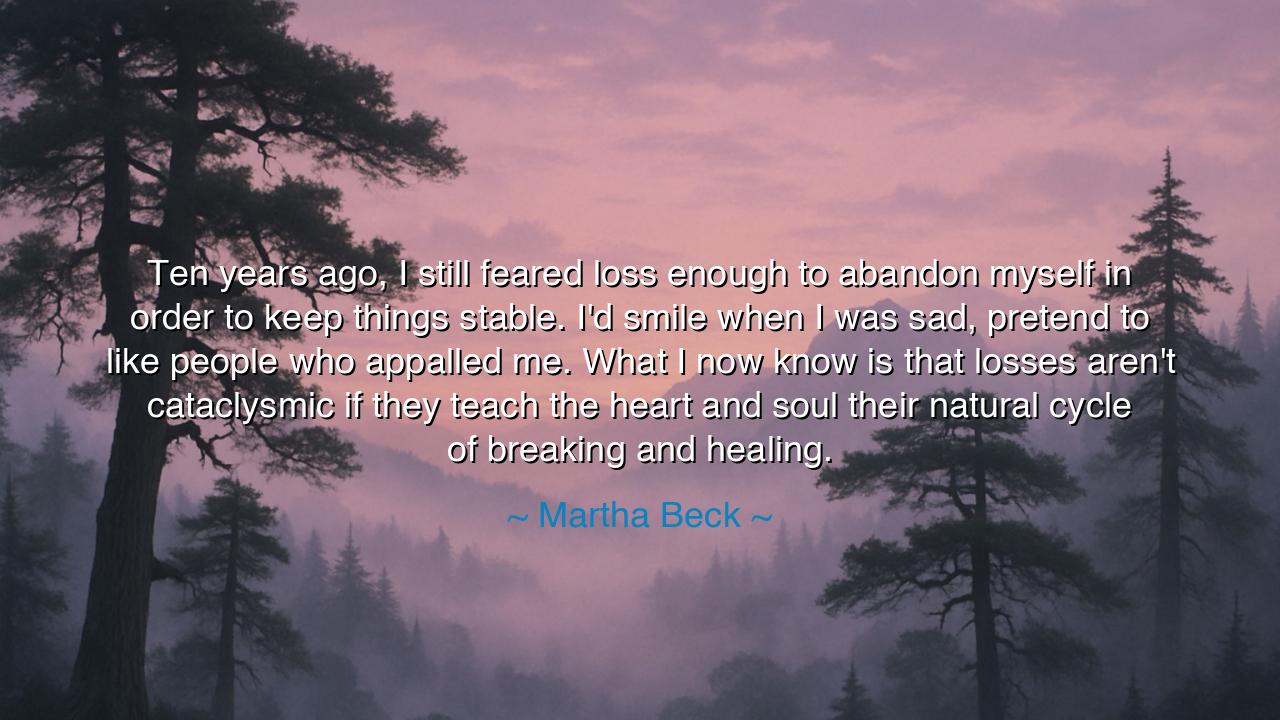
Ten years ago, I still feared loss enough to abandon myself in
Ten years ago, I still feared loss enough to abandon myself in order to keep things stable. I'd smile when I was sad, pretend to like people who appalled me. What I now know is that losses aren't cataclysmic if they teach the heart and soul their natural cycle of breaking and healing.






In the luminous and courageous words of Martha Beck, we are invited to witness a truth that lies at the heart of the human journey: “Ten years ago, I still feared loss enough to abandon myself in order to keep things stable. I'd smile when I was sad, pretend to like people who appalled me. What I now know is that losses aren't cataclysmic if they teach the heart and soul their natural cycle of breaking and healing.” This confession, both intimate and universal, speaks to one of the oldest lessons known to humankind — that pain, when embraced with honesty, becomes transformation. Through these words, Beck stands not as a philosopher distant from suffering, but as one who has walked through it, learned from it, and returned bearing wisdom for all who fear the same abyss.
Her reflection emerges from her own life — a life marked by profound self-examination and spiritual awakening. Martha Beck, a sociologist, author, and life coach, wrote these words after years of inner struggle: the loss of relationships, the breaking away from institutions that once defined her, and the painful shedding of false selves created to appease others. Like many before her, she once believed that safety lay in conformity — in smiling through sorrow, in pleasing rather than truth-speaking, in maintaining the illusion of stability. But the soul, she discovered, cannot live long in pretense. Sooner or later, the spirit demands authenticity, even if the cost is loss. What she learned — and what her quote reveals — is that loss is not the end of life, but the means through which life renews itself.
The ancients knew this cycle well. The Greeks called it metanoia, the sacred change of mind and heart that follows a fall. The Stoics taught that what we fear as destruction is often only transformation in disguise. The philosopher Heraclitus said, “The way up and the way down are one and the same.” Even in the East, the Buddha taught that suffering is not an enemy but a teacher — that the heart must break open to understand compassion, and the soul must release its attachments to find peace. Beck’s words are an echo of this ancient wisdom clothed in modern language: that the heart must learn to break in order to grow whole.
Consider the story of Nelson Mandela, who endured twenty-seven years of imprisonment — years that could have shattered his spirit. Yet he emerged not embittered but strengthened, saying, “I never lose. I either win or learn.” His confinement was not the end, but a crucible that refined his heart. What Beck teaches mirrors this: that our so-called losses — whether they be love, comfort, identity, or certainty — are often the soul’s way of teaching us freedom. Breaking and healing are not opposites but stages of the same sacred rhythm, as necessary as night and day, death and rebirth.
In her confession, Beck reveals something deeper still: that self-abandonment — the act of betraying one’s truth to maintain the peace of others — is a greater loss than any external change. To smile when one’s heart aches, to praise what one inwardly despises, is to exile oneself from authenticity. Yet many walk this path, mistaking compliance for harmony. Beck’s transformation came when she realized that the pain of losing false relationships was far lighter than the burden of losing her own soul. Thus, her quote becomes not merely an observation but a call to courage — to honor one’s true feelings, to face grief without disguise, and to trust the healing that follows.
Her wisdom speaks to all who fear change or loss — those who cling to fading certainties or relationships that no longer nurture the spirit. She teaches that life’s stability does not come from holding everything still, but from learning to flow with its seasons. The heart’s natural rhythm is not constant joy, but expansion and contraction, giving and releasing. Like the ocean that retreats before it returns, the soul, too, must learn to ebb and flow. If we resist this rhythm, we suffer; if we trust it, we grow.
And so, the lesson is clear: Do not fear loss, for it is the teacher of truth. When something precious leaves you — a friendship, a dream, an illusion — do not grasp at it in desperation. Instead, breathe, weep if you must, and wait. For in the quiet after the breaking, the heart begins to weave itself anew — stronger, wiser, more alive. The next time you are tempted to hide your sadness behind a smile, remember Beck’s words: losses are not cataclysms but initiations. Each heartbreak is a passage, each ending a beginning.
Thus, let it be known for all generations: the path of the soul is one of breaking and healing, again and again. To abandon one’s truth for comfort is to live half a life. But to face loss with open eyes is to awaken to the eternal cycle of renewal that governs all things — the rhythm by which stars collapse and are reborn, by which hearts shatter and learn to love again. In embracing that rhythm, as Martha Beck teaches, we find the greatest freedom of all — the freedom to live fully, truthfully, and without fear.






AAdministratorAdministrator
Welcome, honored guests. Please leave a comment, we will respond soon